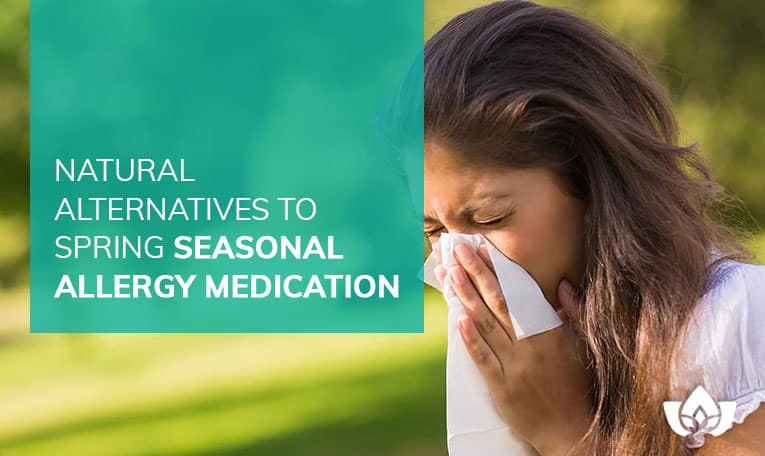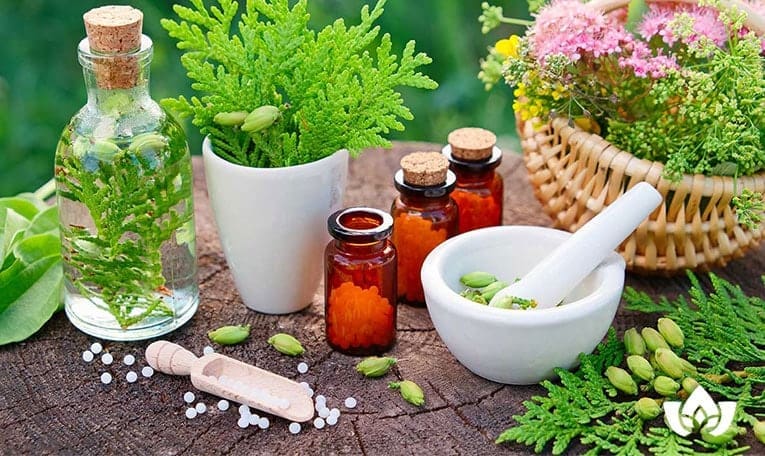
Many people suffer from seasonal allergies, but the side-effects of the medications they use to help them through may sometimes present its own issues.
If you dread dealing with spring seasonal allergies, you’re not alone, but you do have options beyond pharmaceuticals to help. Read on to find out what a few of them are.
What Are Allergies?
Allergies are the body’s reaction to a foreign substance or allergen.
Your body produces antibodies that attack the allergen, even though it’s not actually harmful to your body.
Symptoms of allergic reaction include inflamed skin, sinuses, airways or digestive system, and can also include anaphylaxis in severe cases.
Common Spring Seasonal Allergens
In the case of seasonal allergies, your body overreacts to the presence of pollens, grass, mold or ragweed.
In the spring, specifically, it’s usually because of tree pollen that is released into the air as trees sprout leaves, flowers and fruit; however, grasses and weeds are other common culprits.
Symptoms Of Spring Seasonal Allergies
When the pollen finds its way into your body, it triggers the release of chemicals called histamines into your bloodstream.
These histamines cause runny nose, itchy and/or watery eyes, coughing, sneezing, and possibly a rash or hives.
Natural Solutions For Spring Allergies
Anti-histamines are the over-the-counter medicine that prevent the histamine from triggering your symptoms, but they can cause dry mouth, drowsiness or dizziness, blurred vision, nausea and vomiting, restlessness or moodiness, or trouble sleeping
Luckily, I have seen good results through treatments with a variety of natural remedies, which I have listed for you below.
1. Take Apple Cider Vinegar
Apple cider vinegar has so many uses, but it is also amazing as a natural allergy remedy.
It functions by helping to reduce mucus production and by cleansing your lymphatic system.
If you can, take a tablespoon straight-up; if you find that too difficult, mix it in with a teaspoon of honey and a cup of hot water, and drink this every night.
2. Acupuncture
Acupuncture is a frequently-prescribed treatment for many ailments – it has as many uses as you have meridians, pathways and points on your body, which total more than four hundred.
A 2015 paper by Xue Et Al outlines a study where participants were randomly given either acupuncture or sham acupuncture, which feels like real acupuncture to the person receiving it but doesn’t actually do anything. If you’re familiar with clinical trials, it’s the same idea as giving somebody a sugar pill to account for the placebo effect.
The study found that real acupuncture was significantly better than sham acupuncture in controlling the symptoms of allergic rhinitis (the medical term for hay fever) and that it significantly improved the quality of life of the study participants.
Acupuncture doesn’t cure your allergies, but instead it helps to significantly reduce the symptoms of your allergic reactions; for seasonal allergies, your naturopath will insert tiny needles around your sinuses and nasal area.
Acupuncture points can also be stimulated with electricity without having to use needles, and this method is more convenient for allergies.
3. Consider An Elimination Diet
Often people discover that other allergies – such as food allergies – can aggravate and increase the symptoms of their hay fever, so dealing with those before going into your allergy season can help reduce the overall impact from the pollens.
To implement this method, eat a very bland diet for a week, making sure to avoid all possible allergenic foods.
At the end of this time, start to reintroduce your most commonly-used foods one by one, carefully noticing your body’s reactions to them; if you notice itchiness or additional phlegm after adding a new food, it can indicate a food sensitivity.

4. Homeopathy
Homeopathy is the use of tiny amounts of natural substances (such as plants and minerals) to simulate the body’s natural healing process.
For seasonal allergies, a naturopath might recommend allium cepa, euphrasia, natrum muriaticum, nux vomica, or wyethia.
These can be combined or used to treat the various symptoms of seasonal allergies as they crop up.
5. Lifestyle Changes
During peak allergy season, and if you’re very susceptible, you may have to reduce your time spent outdoors – but that doesn’t mean you have to spend every moment inside.
Using a dust mask while you’re outdoors in the yard means you don’t have to worry about disturbing the allergens while you work.
You can also take advantage of your air conditioner while you’re in your home or car.
Fabrics can attract and collect pollen, so get rid of unnecessary carpets, stuffed toys, and be sure to wash bedding weekly with hot water; another option is to find allergen-proof covers for your bed and pillows.
Call The Mindful Healing Clinic
If you find yourself carrying around a box of tissues every spring, perhaps it’s time to give yourself a break by planning in advance to reduce the impact of your allergies.
Call now to book an appointment with me and let me help you figure out your triggers as well as the best plan for overcoming them.
I can recommend the right treatments for you so that you can enjoy your spring outdoors again.
Until next time,
Dr. Maria Cavallazzi, N.D
Mindful Healing Naturopathic Clinic
Mississauga, ON L5M 1L7
(905) 819-8200
► https://g.page/MindfulClinicNaturopathic
Dr. Maria Cavallazzi is a medical doctor from Colombia where she practiced as a family physician for 8 years until she moved to Canada 16 years ago and became a naturopathic doctor in Mississauga.


